Law
Estate Willed by Talkie
Video wills have become quite common, but they weren't back in 1931. So the unnamed testator described below was breaking new ground by creating one (or rather, a filmed will).I particularly like the detail that he left instructions on where everyone should sit while watching the film, so that he could look at each person directly from the grave.
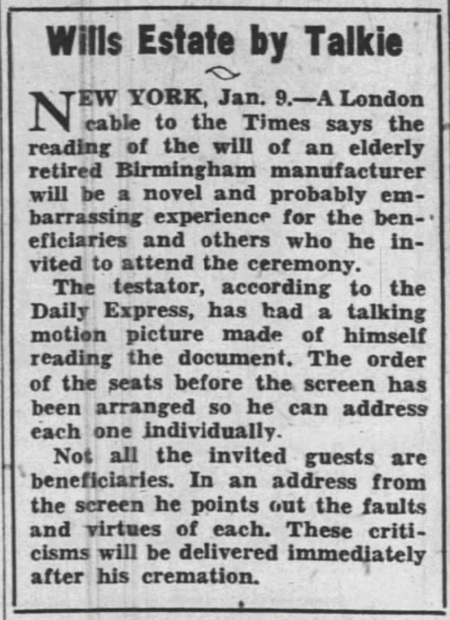
Wichita Eagle - Jan 10, 1931
Posted By: Alex - Sat Mar 30, 2024 -
Comments (0)
Category: Death, Inheritance and Wills, Law, Movies, 1930s
Is it marijuana or alfalfa?
Peter Hlookoff had an unusual strategy to avoid being convicted for possession of marijuana — he always carried a container of alfalfa with him.His reasoning was that alfalfa and marijuana smell similar (so he claimed). So if the police ever arrested him for possession of marijuana he could claim that it was actually alfalfa they had smelled (or seen him smoking).
This strategy was put to the test in Dec 1967 when the police raided his apartment and arrested him for smoking pot. During the subsequent court case his defense led to the magistrate arranging for a court employee to smoke marijuana so that its smell could be compared to alfalfa.
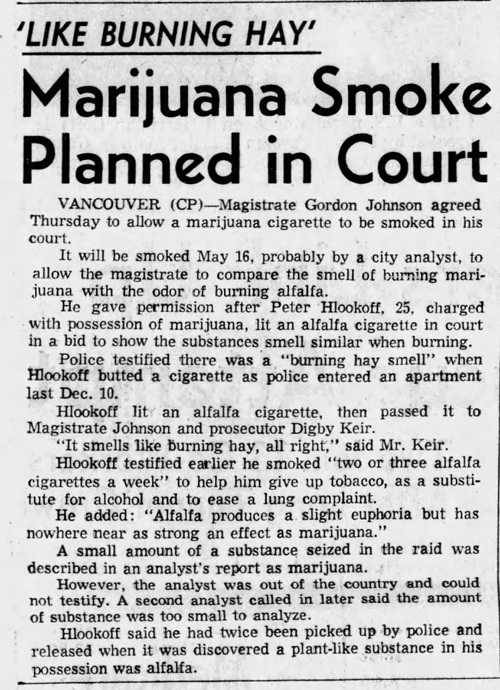
Victoria Times Colonist - May 10, 1968
Unfortunately the courtroom experiment was cancelled before it took place, and the magistrate ended up finding Hlookoff guilty. He didn't buy Hlookoff's follow-up argument that if, perhaps, it had been marijuana he was smoking then someone must have (without his knowledge) put marijuana in his alfalfa container.
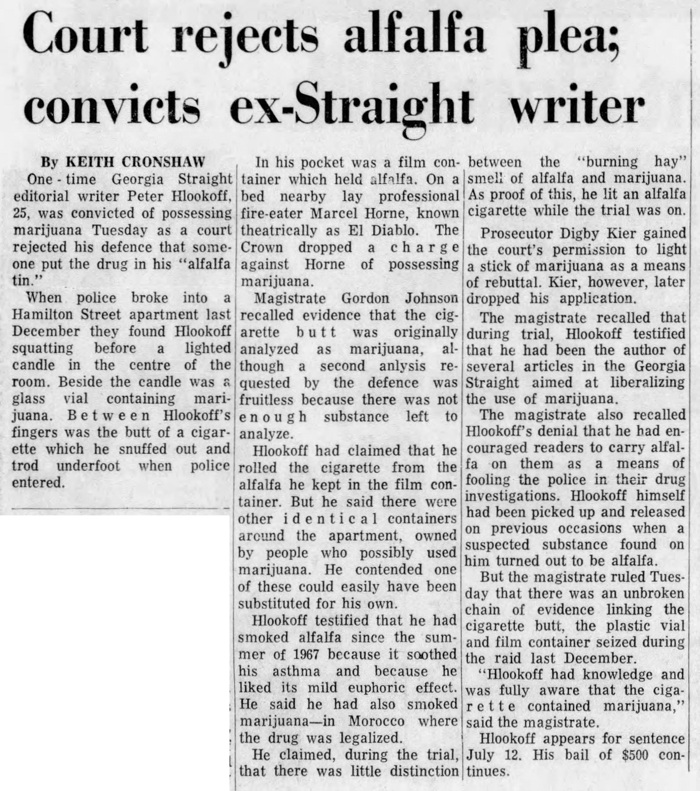
The Vancouver Province - July 3, 1968
Hlookoff's roommate, Marcel Horne (a professional firebreather whose stage name was 'El Diablo'), later wrote an autobiography in which he revealed that, yeah, they were absolutely smoking pot when the police raided their apartment:
We were rapping away very stoned, when we heard someone coming up the stairs. The next thing we knew two cops in uniform walked into the room. Peter tried to drop the roach but the cop saw him. I was too stoned to think properly so I just lay there watching the nightmare. The cops put us up against the wall and frisked us. "Who does the marijuana belong to?" We both answered, "What marijuana?"
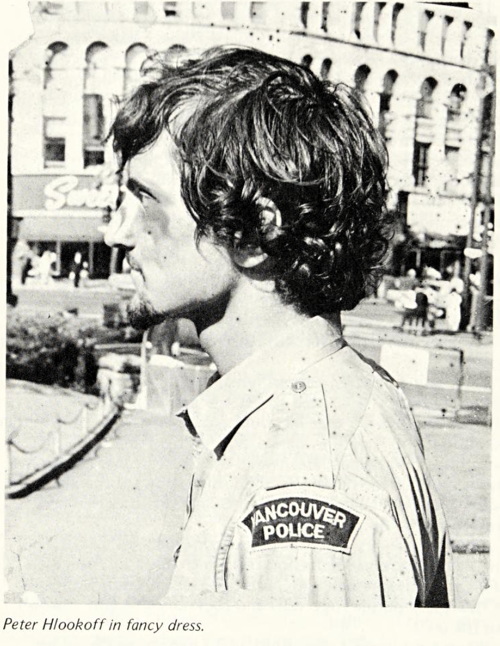
image source: Annals of the Firebreather (1973), by Marcel Horne
Posted By: Alex - Wed Mar 27, 2024 -
Comments (2)
Category: Drugs, Smoking and Tobacco, Law, 1960s
Working on Sunday
The UK's Shops Act made it illegal to operate a shop on Sunday... unless one was Jewish (since the Jewish observed the sabbath on Saturday). So business owner Mike Robertson figured that to open his stores on Sunday he simply had to make his staff convert to Judaism.The Shops Act had other oddities. According to the London Telegraph, a shop could stay open if it was "in an officially designated 'holiday resort area'" or if it restricted sales to "certain kinds of perishable goods, like fruit, flowers and vegetables; medical and surgical appliances, newspapers, cigarettes and refreshments."
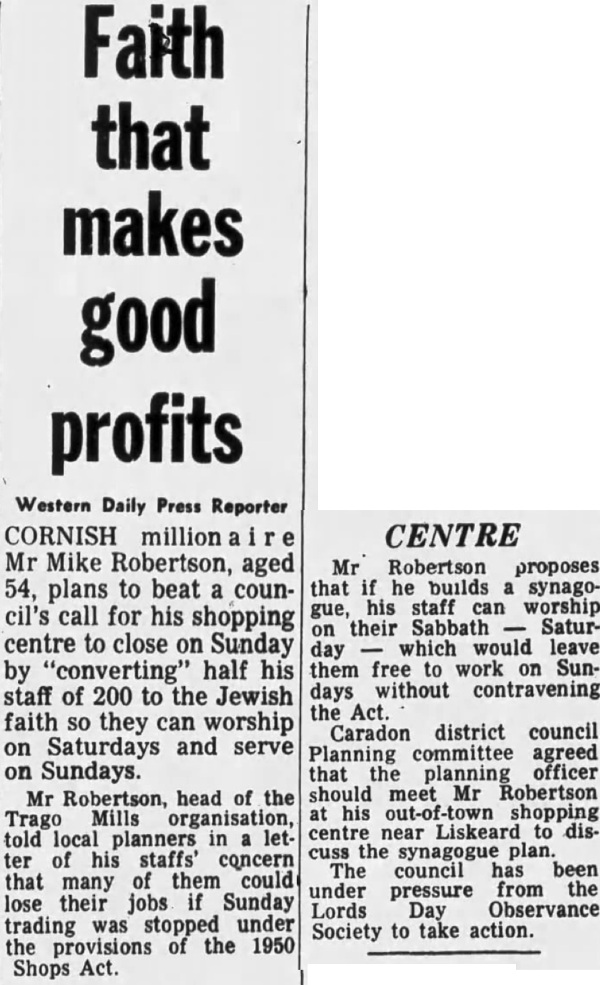
Bristol Western Daily Press - Mar 8, 1977
Posted By: Alex - Fri Mar 22, 2024 -
Comments (2)
Category: Business, Law, Religion, 1970s
The Fifth Dimension Sings “The Declaration of Independence”
Was this the secret origin of SCHOOLHOUSE ROCK?
Posted By: Paul - Mon Feb 26, 2024 -
Comments (0)
Category: Law, Music, Politics, PSA’s, Twentieth Century
Kilty as charged
A case of being guilty of being Kilty.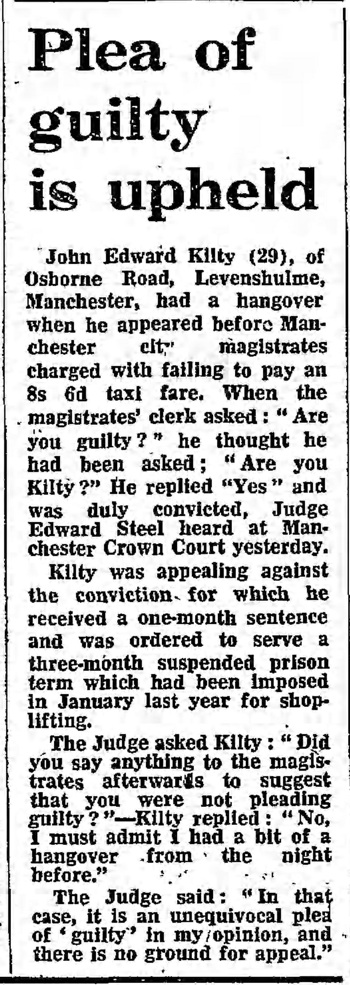
The Guardian - Feb 25, 1969
Posted By: Alex - Sat Feb 10, 2024 -
Comments (0)
Category: Law, Judges, Odd Names, 1960s
The Judge who wanted to be fully informed
Nov 1976: Roxbury District Court Judge Elwood McKenney, presiding over a cocaine possession case, announced that he would need to try cocaine himself before he made his ruling... in order to be able to make an informed decision. He recessed the trial until he had done so.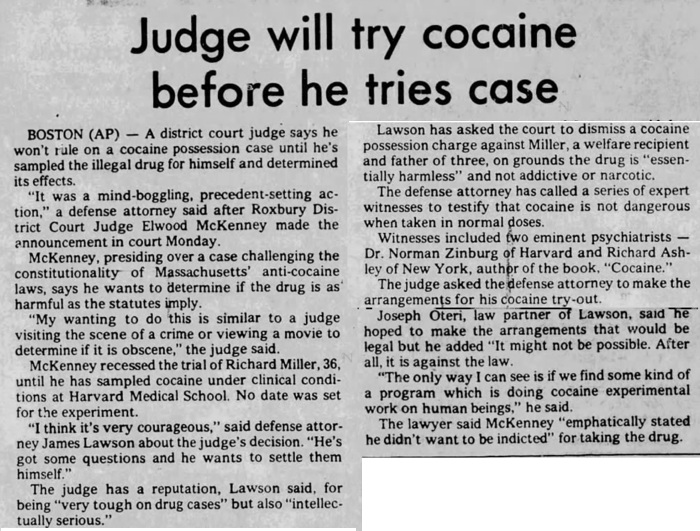
Palo Alto Times - Nov 2, 1976
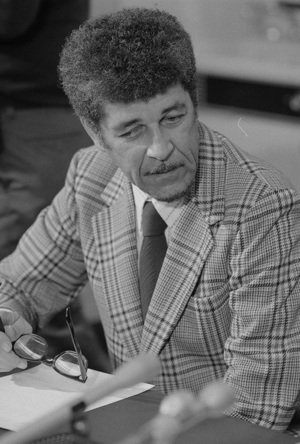
Judge Elwood McKenney
About a month later, McKenney abandoned his decision to try cocaine, saying that all the publicity about it had distorted his intent.
But he then proceeded to rule that the Massachusetts statutes forbidding the possession of cocaine were unconstitutional.
Obviously his ruling must have been dismissed or overturned at some point, otherwise cocaine would now be legal in Massachusetts. But I haven't been able to figure out when that happened.
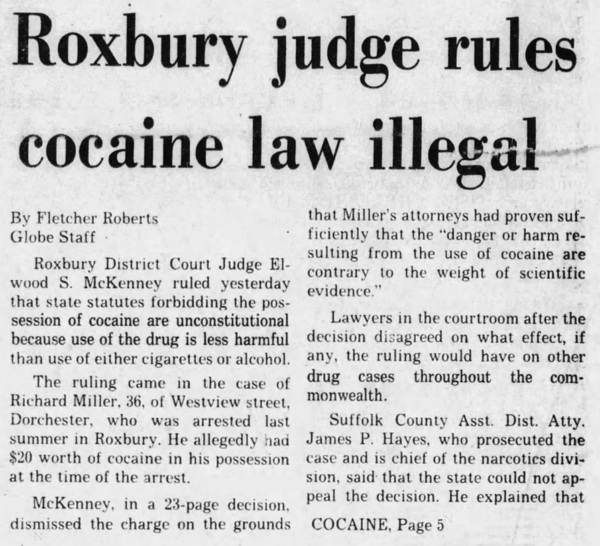
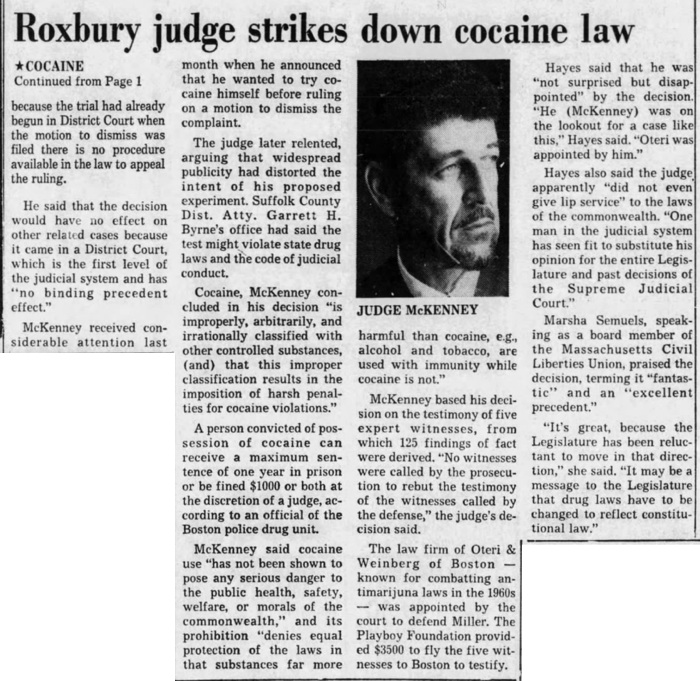
Boston Globe - Dec 11, 1976
Posted By: Alex - Thu Jan 18, 2024 -
Comments (1)
Category: Drugs, Law, Judges, 1970s
Unreasonable suspicion
Does a police officer have the right to search your car if you don't laugh when he asks you if you have any "firearms, drugs, cats, dogs, alligators, and weapons" in your car? The court said no.United States v. Holloway, 2023 U.S. Dist. LEXIS 187752 (E.D. Pa. Oct. 18, 2023):
While courts "do give considerable deference to police officers' determinations of reasonable suspicion, … courts do not owe them blind deference." United States v. Alvin, 701 F. App'x 151, 156 (3d Cir. 2017) (internal quotations omitted). The Court does not find that laughing at a law enforcement officer while being questioned about drugs and weapons would be an appropriate response. Moreover, failing to laugh at a bizarre question while being questioned about drugs and weapons does not create reasonable suspicion to remove an individual from a car after a traffic violation.
via Fourth Amendment.com
Posted By: Alex - Thu Oct 26, 2023 -
Comments (1)
Category: Law, Police and Other Law Enforcement
Ill-Treating Prawns
We've previously posted about a British case involving cruelty to goldfish. Here the British courts took up the question of whether it's possible to be cruel to prawns (aka shrimp), but dropped the case when it decided that prawns were insects and so not covered by anti-cruelty laws. They're actually crustaceans, but close enough I guess.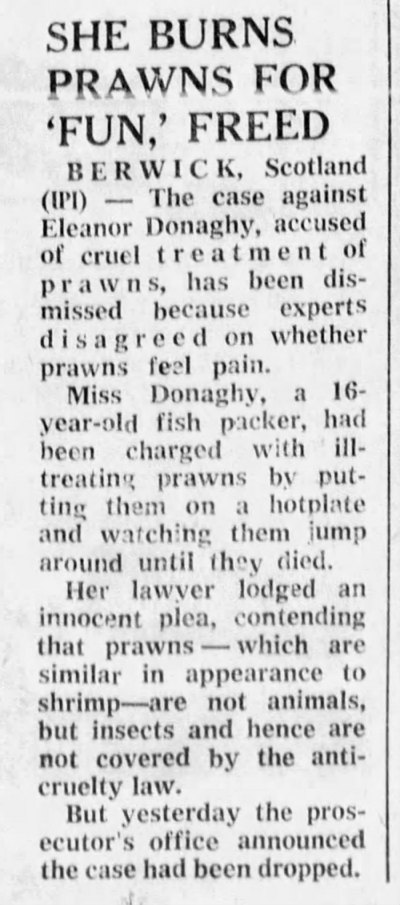
Feb 28, 1974 - Minneapolis Star
Posted By: Alex - Mon Sep 25, 2023 -
Comments (2)
Category: Insects and Spiders, Law, Sadism, Cruelty, Punishment, and Torture, United Kingdom
Biggest gratuity ever?
In 1941, when Dolores Moran was 15, she worked as a waitress at a drive-in restaurant in San Jose, California. One day she served a local farmer some coffee and hamburger. The next year Moran left San Jose and moved to Hollywood where she achieved brief fame as an actress.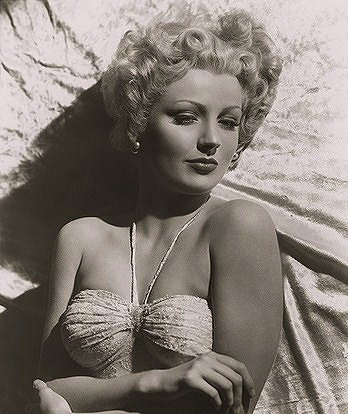
Dolores Moran. Image source: wikipedia
By the 1960s her acting career had ended. But then, in 1968, Moran learned that the farmer she had served at the drive-in 27 years ago had died, leaving her his apricot orchard valued at around $300,000 (or $2.5 million in today's money).
Moran had no memory of serving the farmer, whose name was Anthony Ponce. Nor had the two ever communicated since then. She said, "for the life of me I can't remember the man." But evidently she had made a big impression on him.
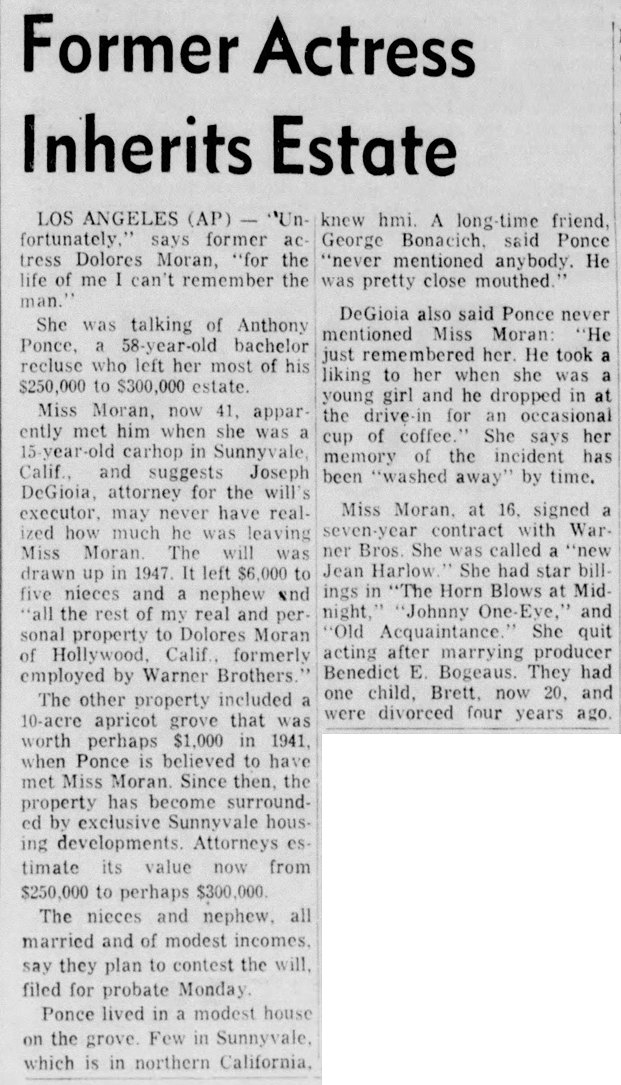
Monroe News Star - Dec 18, 1968
Ponce's relatives contested the will, arguing that he was not of sound mind when he made it. I haven't been able to find out how the case was settled, but I'm guessing Moran got to keep the orchard since it's usually fairly difficult to invalidate a will.
If she did get to keep it, then that would have to count as one of the biggest gratuities of all time. Perhaps the biggest? Especially for an order of coffee and hamburger.
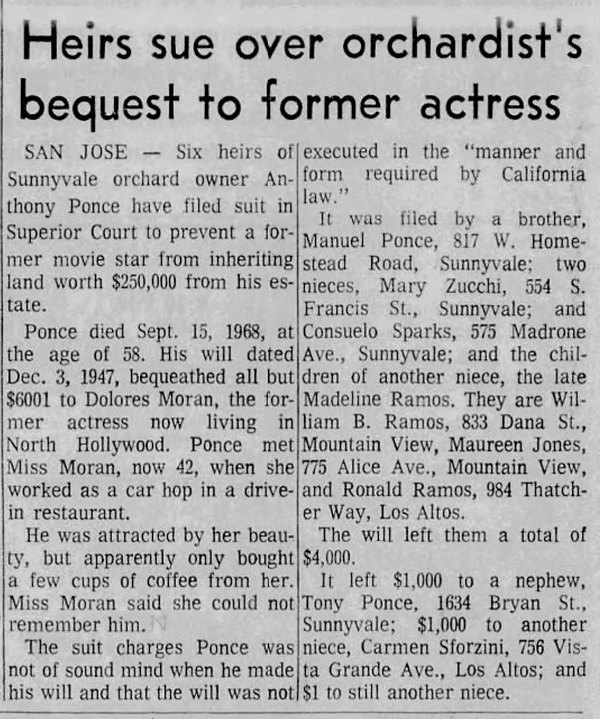
Peninsula Times Tribune - Feb 19, 1969
Posted By: Alex - Thu Apr 06, 2023 -
Comments (3)
Category: Death, Inheritance and Wills, Law, Restaurants, Actors
The right to wear a bikini while mowing the lawn
May 1966: The charges of indecent exposure, brought against 21-year-old Mary Lou Hood for mowing her lawn while wearing a bikini, were all dropped. The judge determined there was insufficient evidence of lewdness or indecent exposure to support the charges.The case was said to be the hottest issue in the college town of Edmond, Ohlahoma "since canned beer." The judge delivered his decision to a standing-room-only crowd. The case also received widespread national media coverage even though, as Hood's lawyer noted, the case didn't actually establish a legal precedent for a right to wear a bikini while mowing the lawn.
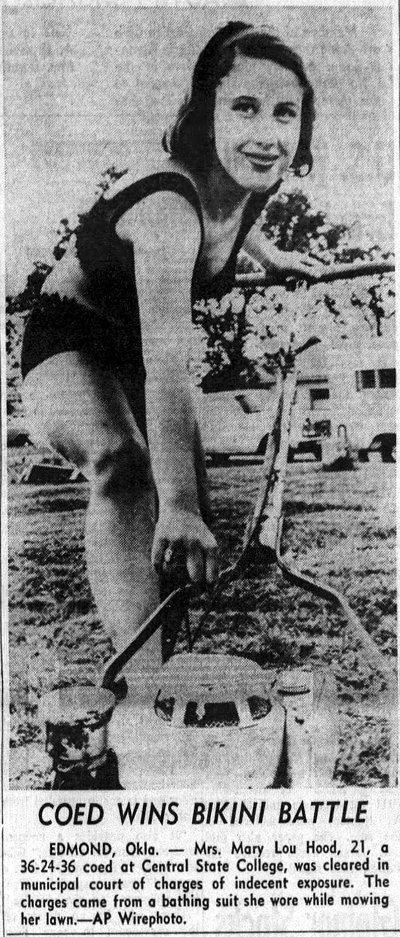
Muncie Evening Press - May 20, 1966
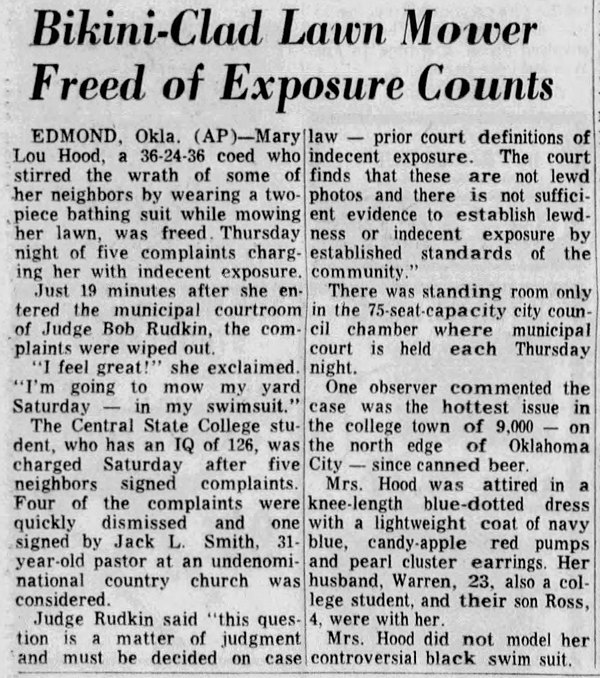
Spokesman Review - May 20, 1966
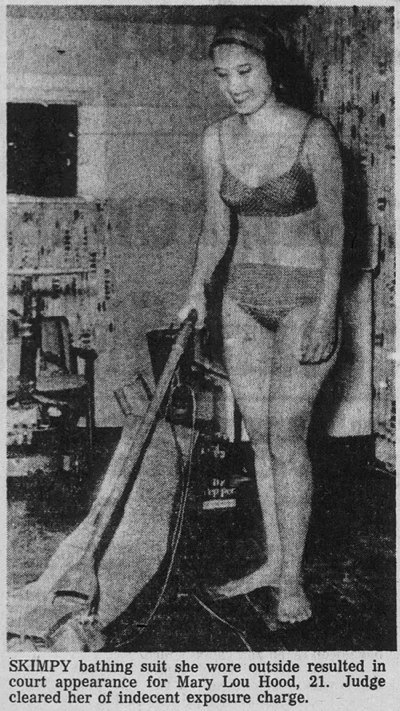
Ogden Standard Examiner - May 20, 1966
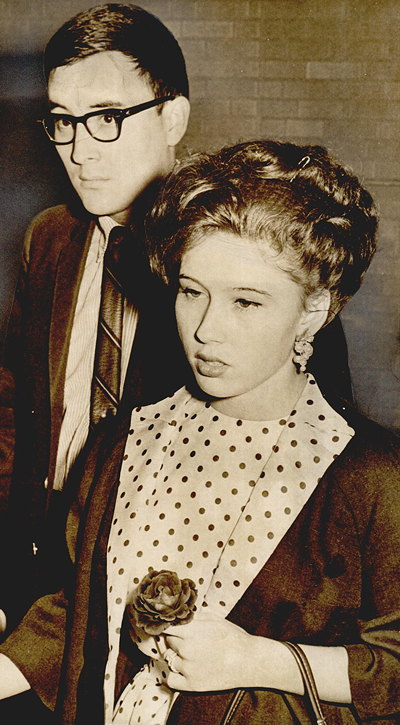
Mary Lou Hood, with her husband, at the courthouse
May 20, 1966. Source.
Posted By: Alex - Tue Nov 01, 2022 -
Comments (9)
Category: Fashion, Law, 1960s

| Who We Are |
|---|
| Alex Boese Alex is the creator and curator of the Museum of Hoaxes. He's also the author of various weird, non-fiction, science-themed books such as Elephants on Acid and Psychedelic Apes. Paul Di Filippo Paul has been paid to put weird ideas into fictional form for over thirty years, in his career as a noted science fiction writer. He has recently begun blogging on many curious topics with three fellow writers at The Inferior 4+1. Contact Us |




